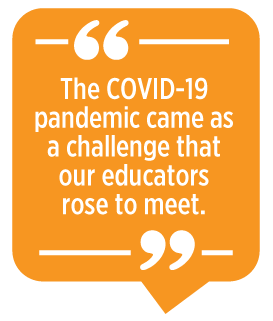From the President: Advocacy in a Time of Crisis
by Deborah J. Short
 It's summer here in the United States and for many the
school year is over. It had been on hiatus for most of the spring as we
grappled with the COVID-19 public health and financial crisis. Although some in
our global community are returning to normal activity, others are unfortunately
confronting rising rates of infection.
It's summer here in the United States and for many the
school year is over. It had been on hiatus for most of the spring as we
grappled with the COVID-19 public health and financial crisis. Although some in
our global community are returning to normal activity, others are unfortunately
confronting rising rates of infection.
Now, in
early July, we in TESOL are poised between two major events that are direct
results of the crisis. We have just completed our first Virtual
TESOL Advocacy & Policy Summit and will soon hold our first Virtual
Convention. Both events came together in just a few months as our
staff and council members pivoted from face-to-face meetings to remote ones.
Despite the sudden transition, the Advocacy & Policy Summit was a
terrific success with close to three times as many registrants than ever before
(309 people!), and the Convention is shaping up to be a triumph as
well.
 The past few
months have offered us opportunities to be strong advocates for our students,
colleagues, and families. The COVID-19 pandemic came as a challenge that our
educators rose to meet. Schools were shut and teachers had to provide remote
learning in any way possible. Some educators made the transition fairly
smoothly—they were familiar with distance-learning technology and their students
were also. But many others had a steep learning curve to climb. Some worked in
school districts and colleges that did not consider the socioemotional needs of
English learners and made no provision for continuing the teaching of English.
Some had learners who lacked devices to support remote teaching and learning,
and/or limitations regarding Internet access, bandwidth, and learning
platforms. Many were unable to assess their students to measure progress or
determine placement. But through incredible amounts of time and effort,
combined with creativity and advocacy for the needs of our learners, our TESOL
members persevered. The myTESOL
COVID-19 space and resources, along with the webinars and other
supports our interest sections, professional learning networks, councils, and
affiliates provided, helped turn what could have been 3 months of lost
instruction into a time of collaboration, compassion, engagement, and
ultimately, language learning.
The past few
months have offered us opportunities to be strong advocates for our students,
colleagues, and families. The COVID-19 pandemic came as a challenge that our
educators rose to meet. Schools were shut and teachers had to provide remote
learning in any way possible. Some educators made the transition fairly
smoothly—they were familiar with distance-learning technology and their students
were also. But many others had a steep learning curve to climb. Some worked in
school districts and colleges that did not consider the socioemotional needs of
English learners and made no provision for continuing the teaching of English.
Some had learners who lacked devices to support remote teaching and learning,
and/or limitations regarding Internet access, bandwidth, and learning
platforms. Many were unable to assess their students to measure progress or
determine placement. But through incredible amounts of time and effort,
combined with creativity and advocacy for the needs of our learners, our TESOL
members persevered. The myTESOL
COVID-19 space and resources, along with the webinars and other
supports our interest sections, professional learning networks, councils, and
affiliates provided, helped turn what could have been 3 months of lost
instruction into a time of collaboration, compassion, engagement, and
ultimately, language learning.
The second
opportunity came with the resurgence of the Black Lives Matter movement. As we
watched in horror at the police brutality that took the lives of Breonna
Taylor, George Floyd, and Rayshard Brooks, to name but a few of the more recent
victims, we realized we needed to make it clear that TESOL is an antiracist
association. Our Statement
on Racial Injustice and Inequality was written to express solidarity
with our Black colleagues and students and others in communities of color. It
reaffirmed TESOL’s commitment to diversity, equity, and inclusion. Social
justice has walked hand-in-hand with English language teaching for many years,
and we must continue to advocate for justice and the end of systemic racism,
discrimination, and bias.
We also need
to listen, reflect, and learn, and TESOL will continue to promote further conversation,
education, and professional development. We have published online a freely
available special issue of curated articles from TESOL
Quarterly and TESOL Journal entitled “Race,
Identity and English Language Teaching” and have collected resources
including readings for self-education and classroom materials to support
antiracist education (coming soon).
Nelson
Mandela said, “Without language, one cannot talk to people and understand them;
one cannot share their hopes and aspirations, grasp their history, appreciate
their poetry, or savour their songs.” We are language educators with knowledge
and expertise that can advance high quality English language teaching. Let us
live and work in a manner that exemplifies our core values, including our
commitment to equity, diversity, multilingualism, multiculturalism, and
individuals’ language rights. Let us continue to advocate for our students,
their families, our colleagues, and our friends and help provide them with safe
and welcoming environments in which to teach and learn.
I
hope to see you at our Virtual
Convention 16–18 July 2020.
Deborah J. Short, PhD, is TESOL International Association president (2020–2021). She directs Academic Language Research & Training, LLC and provides professional development on academic literacy, content-based ESL, and sheltered instruction worldwide. She has led numerous research projects related to English learner education, codeveloped the SIOP Model, and served as series editor for several 6 Principles books.
TESOL Blogs
Interested in writing a blog for TESOL?
Read the submission guidelines and send us your post!
Check out some of the most recent TESOL Blogs:
|
Online Teacher Education Resources in ELT: Language Portraits, by Christine Montecillo Leider and Johanna Tigert

As teacher educators, we constantly redesign our syllabi to include up-to-date content, respond to the ever-changing landscape of educating multilingual learners, and provide multimodal readings and resources. The need for contemporary and online resources has been especially critical after the transition to remote instruction.
In this new blog series, we share with you a variety of ways we have moved teacher education into the virtual space. In this first post, we grapple with the question:
What do we do to replace learning experiences that normally occur through observation and interaction in classrooms?. Read more. |
|
30-Minute PD With Your ELT Team: Norming, by Stephanie Marcotte

Are you looking for professional development (PD) to do with your English language teaching (ELT) team? I’m going to share with you a flexible PD activity that can be done in 30 minutes or over the course of a half day; can be done in-person or online; and provides a way to develop community, build cohesion in how your team evaluates student work, and gives your team an opportunity to think about your teaching and learning objectives. The solution is norming!
This PD activity involves the collective review and evaluation of anonymous student writing or speaking. Collectively, you work with your respective ELT team to review the student to accomplish a goal. This goal is tailored to the specific needs of your team and program. This is great way to closely examine student assignments and assessments within your English learner (EL) program. Read more. |
|
EL Families and School Communities: The Importance of Effective Communication, Ayanna Cooper
 Now more than ever, school communities are working toward strengthening their ability to communicate with the families of the students they serve. For families of English learners (ELs), this communication is especially important and must be two-way. Regardless of the teaching and learning format (e.g., traditional, face-to-face, online/virtual), communication with EL students and their families is a civil rights issue. Read more. Now more than ever, school communities are working toward strengthening their ability to communicate with the families of the students they serve. For families of English learners (ELs), this communication is especially important and must be two-way. Regardless of the teaching and learning format (e.g., traditional, face-to-face, online/virtual), communication with EL students and their families is a civil rights issue. Read more.
|